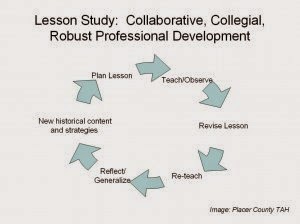 |
| Lesson Study Cycle |
Japanese Lesson Study as a form of teacher professional development has the potential to change how educators view teaching and lesson planning, how they view what students take away from a given lesson, how students view a block of instructional time in the classroom - whether they are just enduring, or whether they are truly engaged and learning. A few conditions have to be met and understood first, however, if Lesson Study is to truly make a difference and take hold in any school setting. This post is not about what Japanese Lesson Study is, or how it works; you can certainly find much on the concept by doing a simple online search. Rather, my purpose here is to document my thoughts on this intense form of professional development.
After spending the week planning, observing, debriefing, and reteaching with this team, it became clear to me that everyone really needed a break. We ended the cycle on Friday, still needing to debrief the re-taught lesson, but agreed that it would just have to wait until Monday. It had been an exhausting week. Mentally taxing. But some of the best PD we had ever been through.
To be clear, this process is not a quick fix; better teaching and deeper understanding do not happen overnight. Lesson Study is a process, the results of which can be powerful and lead to a thorough understanding of concepts over time. For example, we were wondering why our 8th grade students have such a hard time thinking in abstract terms. Is it developmental? Are they even capable of thinking in the abstract, knowing what we know about natural learner characteristics of the adolescent student? Through the intense process of Lesson Study - as the team developed the lesson, observed one of the teachers on the team deliver the lesson, debriefed, made changes, and then re-taught the lesson - we discovered that, through careful and deliberate questions, well-placed times for the teens to turn and talk to one another, the intentional use of visuals to aid in thinking, and plenty of built-in time for reflective thinking and writing, our teens are indeed capable of beginning to understand thinking in abstract terms.
In further posts on this topic, I will explore the topic of "soft starts" and how important it is for the teacher delivering the lesson to feel comfortable and able to put her own creative flair into the lesson (as we discovered after the initial teaching of the lesson). In addition, I will write about how absolutely critical it is that district-level administrators provide support, even if it is only in their understanding that some time out of the classroom is necessary throughout this process (especially for the observation phase of the cycle), and that this time will give back ten-fold in the end. Especially if increased teacher knowledge and instructional prowess is what we're after. Teacher knowledge and skill, after all, do increase levels of student knowledge and achievement. On this, I think we would all agree.


